Learn more about our appointment options, second opinions, locations, referrals, and resources that are at your disposal.

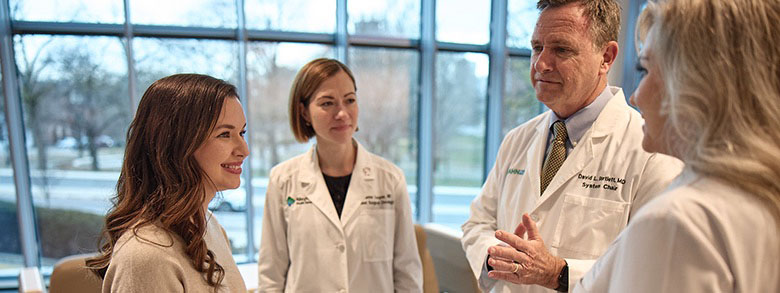
Breast cancer in younger women (under the age of 45) is less common than in older women. About 9% of all breast cancers diagnosed in the United States occur in women under 45.*
Your expert team at Allegheny Health Network (AHN) understands how life-altering a breast cancer diagnosis at a young age can be and how isolating battling cancer can feel. Our breast cancer specialists are here to support you through your journey and help you navigate any challenges that come along.
Our Breast Cancer Center of Excellence created a breast cancer program that has focused and comprehensive care for young women facing a breast cancer diagnosis. The Young Women’s Breast Cancer Initiative is grounded in specialized support for women diagnosed with breast cancer under the age of 45.
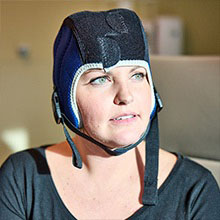
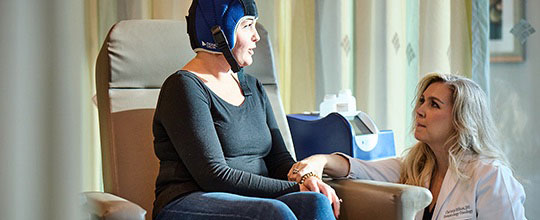
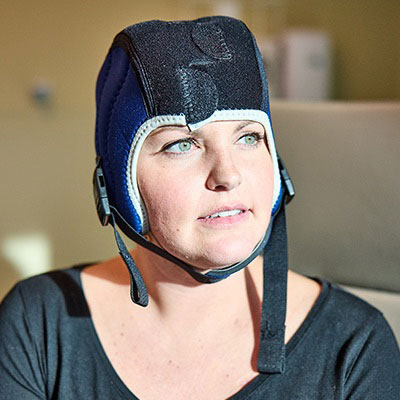

While the cause for breast cancer at a young age is sometimes hereditary, it’s often unknown. If you have a close relative who has had the disease, genetic testing for breast cancer can help you identify whether you have the genetic mutation that can lead to a diagnosis later in life.
Knowing whether you have a breast cancer hereditary risk can help detect breast cancer early on and help you receive treatment quickly. Today, young women diagnosed with an early stage of breast cancer have excellent outcomes with treatment. That’s why breast cancer awareness is so important.
Source: CDC on breast cancer in Young Women.
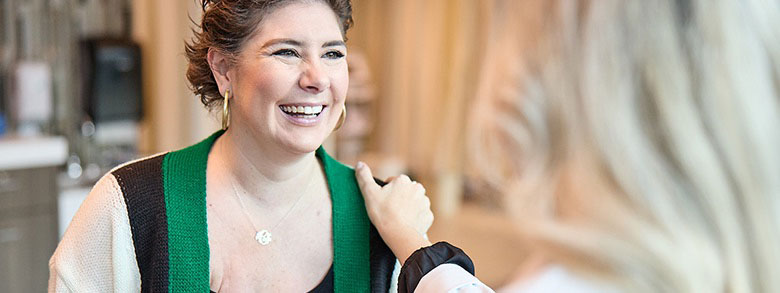
As a patient at AHN, you will still receive state-of-the-art treatments, clinical trial access, and innovative radiation techniques. You will discuss your reconstruction options with plastic surgeons who specialize in breast reconstruction and nipple Resensation® surgery, and surgeons who specialize in microsurgery for lymphedema management. Beyond these services that our Breast Cancer Center of Excellence offers, you also get additional support for issues unique to women under 45. You will also have the option of participating in one of our exercise and nutrition protocols at our novel Exercise Oncology and Resiliency Center.
The Young Women’s Breast Cancer Initiative helps with issues related to the premenopausal years. We address concerns that range from fertility preservation and libido to family and social matters. Our team provides a hereditary breast cancer risk assessment and can explain physical changes you may be experiencing. We offer specialized care for post-menopausal symptoms brought on by premature menopause that can result from breast cancer treatment.
Some cancer treatments, such as chemotherapy, can affect your fertility and ability to become pregnant in the future. Our reproductive endocrinology team is available to help. The AHN Center for Reproductive Medicine offers several options that can help with fertility preservation for breast cancer patients, like IVF or freezing eggs. Learn more about our fertility preservation services and your options before starting your breast cancer treatment.
Breast cancer and its treatments can affect your sex drive due to the physical and emotional impact of the disease. You may undergo physical changes that could affect the way you feel about your body and desire to have sex, such as vaginal dryness and changes in the appearance and sensation of your breasts after surgery. Some breast cancer treatments can contribute to these symptoms. At AHN, we have gynecologists who can help troubleshoot some of these symptoms to get you back to feeling more like you did prior to your diagnosis.
Being diagnosed with breast cancer as a young woman can have an overwhelming effect on your mental health. According to the American Cancer Society, about 1 in 4 people diagnosed with breast cancer will experience depression. You may also experience anxiety, mood swings, insomnia, and fatigue as you go through your treatments.
We know fighting breast cancer is more than just treating your body. That’s why we treat the whole person by offering support services to help you with your mental health as well. AHN provides a Navigation Team to help support you through every step of your cancer treatment journey.




Spending time with others who have a shared or similar experience can help with feelings of depression, frustration, and anxiety. You can find a young woman breast cancer support program closest to you. These groups help to boost your spirits, validate your feelings, and encourage you throughout your journey.
Research has shown exercise can greatly improve quality of life in women with breast cancer. At AHN, you’ll have access to the Exercise Oncology and Resiliency Center. Physicians and physical training specialists provide guidance and support, using exercise to decrease treatment side effects and improve quality of life. Our team will show you workouts that can help reduce fatigue. These exercises can also help boost your appetite, energy, and strength.
You’ll meet with a cancer exercise specialist who will have you perform a fitness exam to determine your health and physical capabilities. Your physician will create an exercise plan based on your diagnosis and goals. Exercise oncology typically involves breathwork, stretching, and balancing exercises to help improve your mobility and prevent injuries.
AHN’s cancer care team includes dietitians who specialize in working with young women with breast cancer. Our nutritionists can provide guidance during treatment and after, including:




Research by the National Cancer Institute shows that acupuncture can relieve a wide range of symptoms associated with cancer treatments, including fatigue and dry mouth caused by radiation therapy. A Glimmer of Hope Foundation offers three acupuncture or massage therapy appointments at no cost to young breast cancer patients. You may also find a certain amount of integrated services free of charge at our Home for Hope locations at the Wexford Health + Wellness Pavilion, West Penn Hospital, and the Metastatic Breast Cancer Clinic at AGH.
Our Navigation Team consists of financial advocates who can help you navigate the cost of breast cancer treatment. Between doctor visits and treatments, we understand how quickly costs can build up, especially for those without insurance. We’re here to help you understand your payment options so you can focus on healing.
Resensation® is a registered trademark of Axogen Corporation and is used with permission.
The Cancer Institute’s Young Women’s Breast Cancer Initiative brings together specialists with expertise in the concerns that young women diagnosed with breast cancer face. From diagnosis to treatment and after, we’re here to support you with holistic care.
Our breast cancer specialists work together as a cross-disciplinary team to coordinate the most effective treatment plan for you. You may work with:
Director of Academic Breast Oncology
Breast Surgeon
Breast Surgeon
Breast Surgeon
Plastic Surgeon
Plastic Surgeon
Plastic Surgeon
Medical Director, AHN Center for Reproductive Medicine
Obstetrics and Gynecology
Radiation Oncologist
Radiation Oncologist
Hematology Oncologist
Hematology Oncologist
Medical Oncologist
Medical Oncologist
Medical Oncologist
Medical Oncologist
Medical Oncologist
Medical Oncologist
Medical Oncologist
Medical Oncologist
Medical Oncologist
Medical Oncologist

Call (412) 578-HOPE (412) 578-4673 to schedule an appointment at any location within the Allegheny Health Network Cancer Institute or connect with a nurse navigator.
AHN specialists lead the NSABP Foundation, the world’s preeminent breast cancer research program. It’s one of the largest focusing on breast cancer clinical trials.
Clinical trials are studies that try to answer questions about new ways to treat cancer with medications, radiation, or surgical techniques. Previous trials have shown how new methods of treatment improve survival and quality of life, and reduce the risk of cancer returning.
You participate in a clinical trial only if you volunteer to do so and meet criteria for inclusion in the study. You can stop participating in a trial at any time.
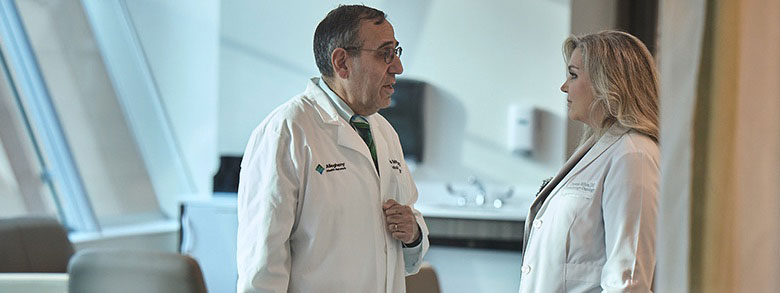
The plan for the trial, called a protocol, explains the goal of the trial and how the study will be conducted. Based on the questions the research is trying to answer, each clinical trial protocol outlines specific criteria necessary to be eligible to join the trial.
Common criteria for entering a trial are:
Federal rules help ensure that clinical trials are run in an ethical manner, with your rights and safety protected. These rules ensure that you’re not put at increased risk by participating in the trial, and that the results of the study are accurate and meaningful.
If you would like to participate in a clinical trial and help our team discover groundbreaking cancer solutions, ask your doctor if you’re eligible to participate in one.
There are three ways for medical professionals who are not a part of Allegheny Health Network to refer their patients to an AHN Cancer Institute specialist and request their first appointment. You can:
For more information about referring your patient to an AHN specialist, read the Independent Physician Referral FAQs.
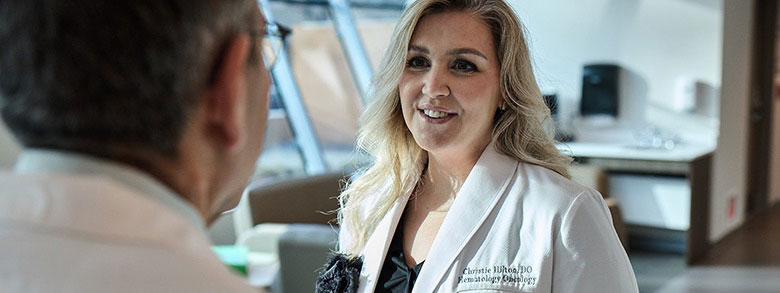
After referring your patient to an AHN specialist, use the EpicCare Link platform to collaborate with their AHN specialist and view your patient's test results, treatment plan, and progress.
Log in to your EpicCare Link account now.
If you are new to EpicCare Link or need to request your own EpicCare Link account, read: EpicCare Link for Patient Follow-up for user instructions and new account request forms.
If you can’t access your patient's AHN test results through the EpicCare Link platform, your patient will need to complete and submit the correct AHN Medical Records Release form based on their state of residency. Support your patient’s request by downloading the correct medical records release form for them:
EpicCare® is a registered trademark of Epic Systems Corporation and used with permission.
EpicCare® Link™ is a trademark of Epic Systems Corporation and used with permission.
Learn more about our appointment options, second opinions, locations, referrals, and resources that are at your disposal.